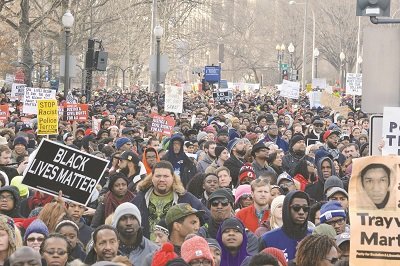
Historians often point to the death of Dr. Martin Luther King Jr. as the end of the modern civil rights movement.
But based on the throng of Americans that marched for justice in several cities last weekend, including Washington, D.C., a new era has begun in the fight for equality, and youth have stepped to the front of the line.
“Our organization recently met with Attorney General Eric Holder, and we believe that local prosecutors should not be handling cases of police-involved shootings,” said the Rev. Fer-Rell M. Malone Sr., president and CEO of the Joshua Project, a Christian outreach ministry founded in his hometown of Waycross, Georgia.
“I drove over 600 miles last night from a town just outside of Atlanta with my son because I can’t sit back and act like nothing is happening. The time to create a better system of accountability is way overdue. Blacks lives simply don’t matter in America, and I’m fearful that something terrible is going to happen if changes aren’t made soon,” said Malone, 52.
Tens of thousands of people – mostly ordinary people – descended on Freedom Plaza in Northwest on Saturday, Dec. 13, for a pre-rally before marching down Pennsylvania Avenue to the steps of the U.S. Capitol. The “Justice for All March,” organized by the Rev. Al Sharpton Jr., president of the National Action Network, brought together the families of Eric Garner, Michael Brown, Tamir Rice, Amadou Diallo, Trayvon Martin and others – all pointing to the deaths of unarmed black men at the hands of police and demanding that members of Congress take action.
The crowd, a rainbow of races, religions and sexual orientations, reflected the diversity that has been this country’s greatest asset and, in some cases, its greatest liability.
One group of children from California learned about the march while visiting the District on a school trip and decided to join the protesters.
“Clearly, a lot of people care about the problem of police brutality and racism but not enough because it’s still happening,” said Izzy Mueller, 13, a student at The Saklan School in Moraga, California, whose mission is to challenge students to “think creatively, act compassionately and live courageously.”
A fellow classmate, whose parents moved to the U.S. from India, said, “Different doesn’t mean bad.”
“Most of us are only 13 or 14, but we know right from wrong. Black boys and black men are being killed, and it’s because of racism. After hundreds of years, America still hasn’t solved that problem. I think we’re on the verge of a revolution,” said Bikram Johal, 13.
One Kentucky State University graduate said she participated in the march but with mixed emotions.
“The fact that it’s young blacks that continue to be killed has really struck a chord and is the reason I’m here today,” said Kamela Fleming, who lives in Bowie, Maryland.
“My father is in his 70s and was active in the movement in the 1960s. I never dreamed that I would have the same kind of tragic stories to tell my children that he shared with me when I was growing up. I don’t want to have to tell my children sad tales. I’m here because I want to be part of the solution – we need to put an end to this,” said Fleming, 23.


